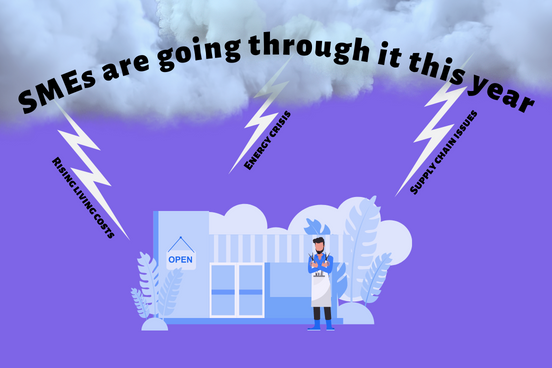
SME business owners are going through it this year.
They’ve been hit with various economic factors fueled by the pandemic and the ongoing conflict between Russia and Ukraine. This is leaving a steady trail of small businesses closing down as the pressures they face become insurmountable.
So exactly what pressures are businesses facing and how can they stay afloat throughout a storm that appears to have no end in sight? We’ve pulled together a few tips for SMEs:
Rise of living costs:
Inflation is forecasted to peak at 13% in Q4 2022 and was at its highest rate since 1982 this July at 10.1% [1]. The soar in living costs has various impacts on SMEs:
- Decrease in consumption, especially of non-essential products/services
- Raises in price of products/services heightens competition possibly leading to lowered customer retention
- Overhead expenses to be cut eg. lowered budgets for marketing etc
- Pressure for increasing employee salaries
SMEs will need to internally audit and re-calculate their operations and budgets to tackle this. You’d be surprised how many unexpected costs could be cut down with simple solutions. An example of this is telecommunications costs.
Many businesses still operate their customer support via traditional landline phone systems requiring contracts with carriers. As these contracts come to an end and with inflation at an all-time high, SMEs are faced with big telecommunications bills for the coming years. To cut down on these costs, switching to a VoIP phone system like Devyce will be beneficial.
Devyce is a hybrid phone system that provides two numbers on your phone. This means businesses won’t need to invest in physical landlines or providing handsets to employees while still operating with a reliable phone system.
Energy crisis:
The price cap of energy costs is set to increase to 80% in October 2022 resulting in an increase of roughly £1600 per year for “typical” consumption levels of energy per household [2]. What does this mean for SMEs?
- Providers are removing lower cost tariffs
- Pressure to reduce essential costs to accommodate which have negative long term effects
- Closures of physical locations
Ways to overcome the spike in energy costs is to invest in sustainability and adopt greener practices. For example, with an abundance of reliable communications tools available such as Devyce, many businesses could look into adopting remote working models to cut down on use of office space. This saves businesses money, reduces impact on the environment due to reduced commuting of employees and use of energy at offices.
For more sustainable solutions that could save your business on massive energy costs, check out our blog post:
Five unexpected ways businesses can be more sustainable
Supply chain issues:
The supply chain problem is a cycle of poor management of logistics both internally and externally for businesses. The challenges with supply chain logistics are partly due to less staff resulting from the pandemic and is expected to continue into 2023 [3].
This has resulted in:
- 79% of SMEs facing increased prices from suppliers over the past 6 months [4]
- Major delays in exporting of goods leading to long wait times for customers to receive goods, affecting customer experience
- Exacerbation of inflation leading to increased competition between businesses
What SMEs could do to minimise the effect is firstly to internally audit their processes eg. stock intake and maintenance etc. By optimising these processes, SMEs can mitigate the supply chain challenge by ensuring they can plan well for stock replenishment. Business owners could also look into working with more local suppliers which are more likely to be able to deliver with minimal disruptions.
The past couple of years have undoubtedly been tough on small businesses. The differences between businesses that are able to continue trading and those that are forced to close are flexible businesses making necessary adaptations to face the piling challenges. Make a smart business decision and find out more about how Devyce could help you cut costs and tackle these challenges here:
References:
[1] https://commonslibrary.parliament.uk/research-briefings/cbp-9428/
[4]https://startups.co.uk/news/supply-chain-inflation-uk-smes/
